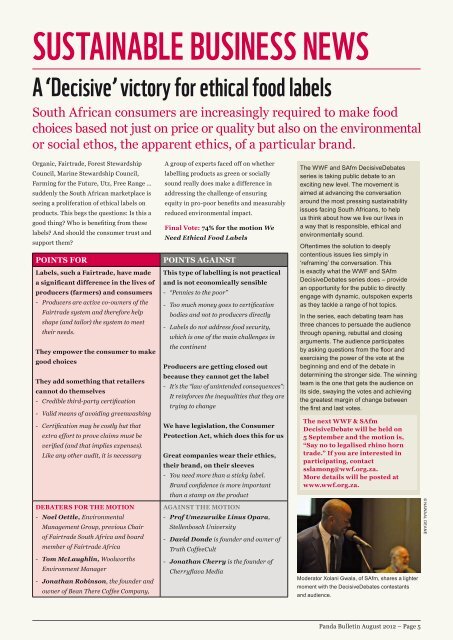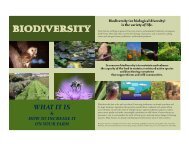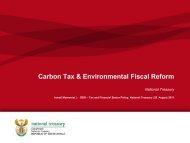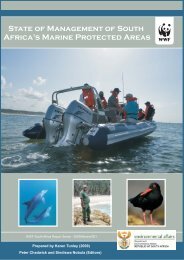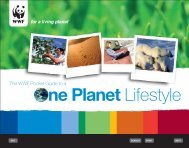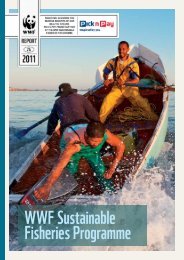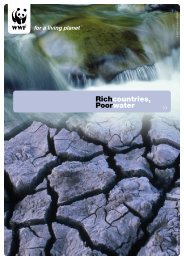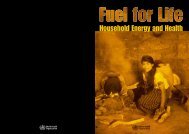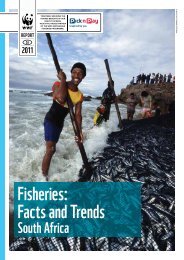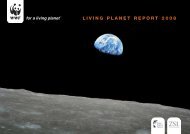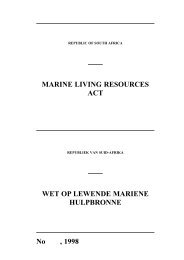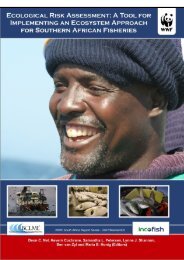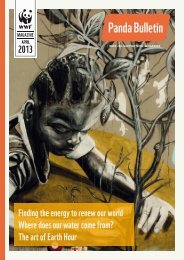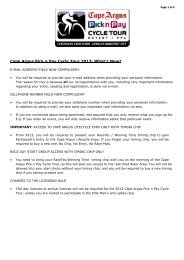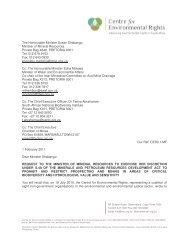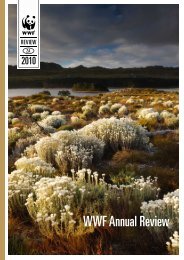Living Planet Report - WWF South Africa
Living Planet Report - WWF South Africa
Living Planet Report - WWF South Africa
Create successful ePaper yourself
Turn your PDF publications into a flip-book with our unique Google optimized e-Paper software.
SUSTAINAbLE bUSINESS NEWS<br />
A ‘Decisive’ victory for ethical food labels<br />
<strong>South</strong> <strong>Africa</strong>n consumers are increasingly required to make food<br />
choices based not just on price or quality but also on the environmental<br />
or social ethos, the apparent ethics, of a particular brand.<br />
Organic, Fairtrade, Forest Stewardship<br />
Council, Marine Stewardship Council,<br />
Farming for the Future, Utz, Free Range …<br />
suddenly the <strong>South</strong> <strong>Africa</strong>n marketplace is<br />
seeing a proliferation of ethical labels on<br />
products. This begs the questions: Is this a<br />
good thing? Who is benefiting from these<br />
labels? And should the consumer trust and<br />
support them?<br />
A group of experts faced off on whether<br />
labelling products as green or socially<br />
sound really does make a difference in<br />
addressing the challenge of ensuring<br />
equity in pro‑poor benefits and measurably<br />
reduced environmental impact.<br />
Final Vote: 74% for the motion We<br />
Need Ethical Food Labels<br />
POINTS FOR POINTS AGAINST<br />
Labels, such a Fairtrade, have made<br />
a significant difference in the lives of<br />
producers (farmers) and consumers<br />
- Producers are active co-owners of the<br />
Fairtrade system and therefore help<br />
shape (and tailor) the system to meet<br />
their needs.<br />
They empower the consumer to make<br />
good choices<br />
They add something that retailers<br />
cannot do themselves<br />
- Credible third-party certification<br />
- Valid means of avoiding greenwashing<br />
- Certification may be costly but that<br />
extra effort to prove claims must be<br />
verified (and that implies expenses).<br />
Like any other audit, it is necessary<br />
DEBATERS FOR ThE MOTION<br />
- Noel Oettle, Environmental<br />
Management Group, previous Chair<br />
of Fairtrade <strong>South</strong> <strong>Africa</strong> and board<br />
member of Fairtrade <strong>Africa</strong><br />
- Tom McLaughlin, Woolworths<br />
Environment Manager<br />
- Jonathan Robinson, the founder and<br />
owner of Bean There Coffee Company,<br />
This type of labelling is not practical<br />
and is not economically sensible<br />
- “Pennies to the poor”<br />
- Too much money goes to certification<br />
bodies and not to producers directly<br />
- Labels do not address food security,<br />
which is one of the main challenges in<br />
the continent<br />
Producers are getting closed out<br />
because they cannot get the label<br />
- It’s the “law of unintended consequences”:<br />
It reinforces the inequalities that they are<br />
trying to change<br />
We have legislation, the Consumer<br />
Protection Act, which does this for us<br />
Great companies wear their ethics,<br />
their brand, on their sleeves<br />
- You need more than a sticky label.<br />
Brand confidence is more important<br />
than a stamp on the product<br />
AGAINST ThE MOTION<br />
- Prof Umezuruike Linus Opara,<br />
Stellenbosch University<br />
- David Donde is founder and owner of<br />
Truth CoffeeCult<br />
- Jonathan Cherry is the founder of<br />
Cherryflava Media<br />
The <strong>WWF</strong> and SAfm DecisiveDebates<br />
series is taking public debate to an<br />
exciting new level. The movement is<br />
aimed at advancing the conversation<br />
around the most pressing sustainability<br />
issues facing <strong>South</strong> <strong>Africa</strong>ns, to help<br />
us think about how we live our lives in<br />
a way that is responsible, ethical and<br />
environmentally sound.<br />
oftentimes the solution to deeply<br />
contentious issues lies simply in<br />
‘reframing’ the conversation. This<br />
is exactly what the <strong>WWF</strong> and SAfm<br />
DecisiveDebates series does – provide<br />
an opportunity for the public to directly<br />
engage with dynamic, outspoken experts<br />
as they tackle a range of hot topics.<br />
in the series, each debating team has<br />
three chances to persuade the audience<br />
through opening, rebuttal and closing<br />
arguments. The audience participates<br />
by asking questions from the floor and<br />
exercising the power of the vote at the<br />
beginning and end of the debate in<br />
determining the stronger side. The winning<br />
team is the one that gets the audience on<br />
its side, swaying the votes and achieving<br />
the greatest margin of change between<br />
the first and last votes.<br />
The next <strong>WWF</strong> & SAfm<br />
DecisiveDebate will be held on<br />
5 September and the motion is,<br />
“Say no to legalised rhino horn<br />
trade.” If you are interested in<br />
participating, contact<br />
sslamong@wwf.org.za.<br />
More details will be posted at<br />
www.wwf.org.za.<br />
Moderator Xolani Gwala, of SAfm, shares a lighter<br />
moment with the DecisiveDebates contestants<br />
and audience.<br />
Panda Bulletin August 2012 – Page 5<br />
© NAWAAl DeANe


